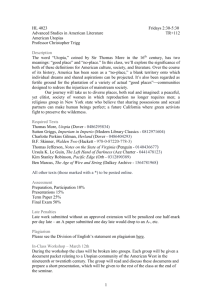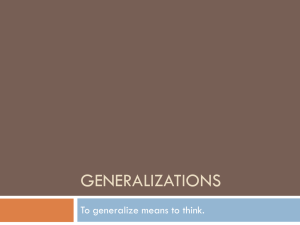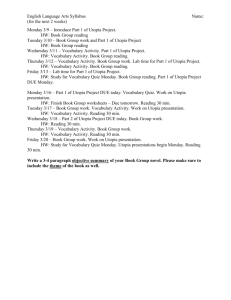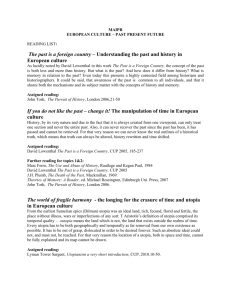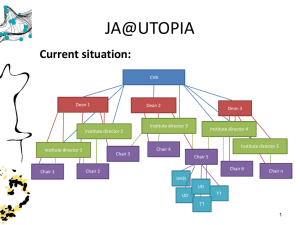University of Kent
advertisement
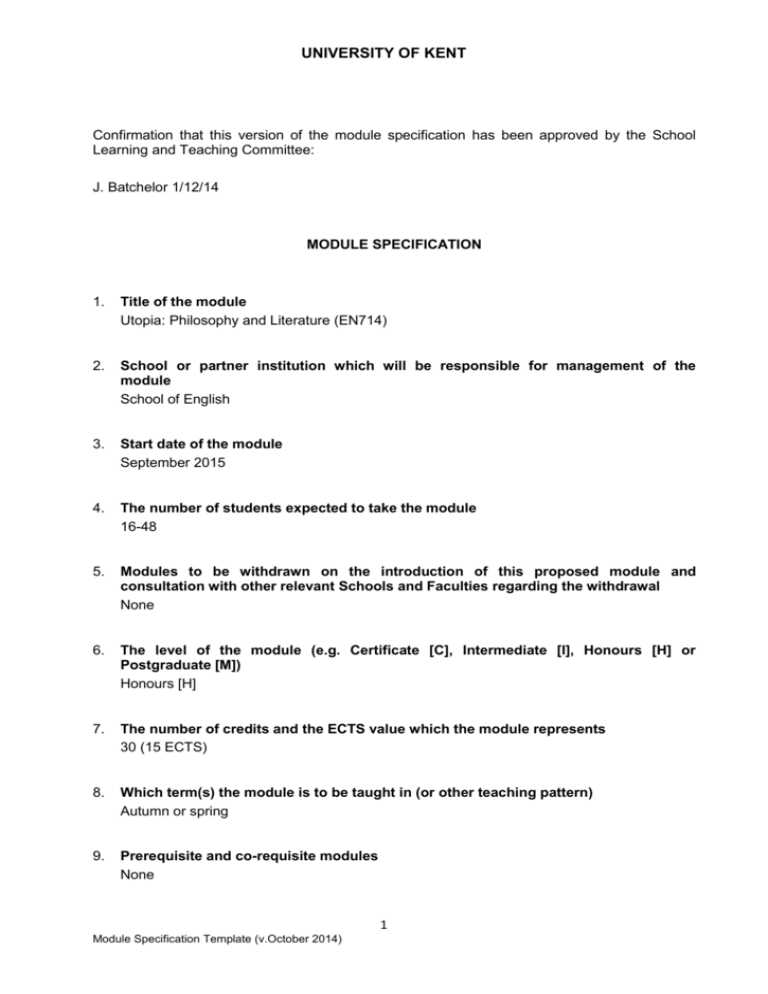
UNIVERSITY OF KENT Confirmation that this version of the module specification has been approved by the School Learning and Teaching Committee: J. Batchelor 1/12/14 MODULE SPECIFICATION 1. Title of the module Utopia: Philosophy and Literature (EN714) 2. School or partner institution which will be responsible for management of the module School of English 3. Start date of the module September 2015 4. The number of students expected to take the module 16-48 5. Modules to be withdrawn on the introduction of this proposed module and consultation with other relevant Schools and Faculties regarding the withdrawal None 6. The level of the module (e.g. Certificate [C], Intermediate [I], Honours [H] or Postgraduate [M]) Honours [H] 7. The number of credits and the ECTS value which the module represents 30 (15 ECTS) 8. Which term(s) the module is to be taught in (or other teaching pattern) Autumn or spring 9. Prerequisite and co-requisite modules None 1 Module Specification Template (v.October 2014) UNIVERSITY OF KENT 10. The programmes of study to which the module contributes English and American Literature; English, American and Postcolonial Literatures, English and American Literature with Creative Writing 11. The intended subject specific learning outcomes On successful completion of this module the student will be able to demonstrate: 11.1 Analytical knowledge of aspects of the philosophy and theory of utopia from Plato to the present day; 11.2 An analytical, theoretical, and literary-critical understanding of selected key texts of twentieth-century utopian and dystopian literature; 11.3 An ability to relate the theoretical and literary texts to the historical pattern of events; 11.4 An in-depth understanding of the nature of the state and of the role played by speculative thought and imaginative literature in the analysis of the present and preparation for the future. 12. The intended generic learning outcomes On successful completion of this module the student will be able to: 12.1 Form arguments using philosophical and literary-critical vocabulary; 12.2 Display strong presentation and group discussion skills; 12.3 Possess an increased capacity for self-directed research and the ability to discuss, evaluate and creatively deploy secondary critical and theoretical perspectives making use of appropriate scholarly sources; 12.4 Identify appropriate research questions and demonstrate the ability to construct original, clear, well-substantiated arguments. 13. A synopsis of the curriculum The module examines some key texts in the theory and literary presentation of utopia. In the first part of the module we will examine classic early utopian texts (Plato, More) and will set these in the context of the modern theory of historical progress (Hegel) the failure of that progress to materialise (Agamben) and the nature of hope for the future (Bloch). In the second part of the module, we will examine modern classics which look at the failure of the communist utopia (Zamyatin, Huxley, Orwell) and at later texts which revived the genre of utopia (LeGuin, Atwood). 14. Indicative Reading List Plato (repr. 2008), The Republic. Oxford: Oxford World’s Classics. Thomas More (repr. 2012), Utopia. London: Penguin. Hegel (repr. 2004), Introduction to The Philosophy of History. Minneola, NY: Dover. Aldous Huxley (repr. 2007), Brave New World, London: Vintage. George Orwell (repr. 2013), 1984. London: Penguin, 2013. Margaret Atwood (repr. 1996), The Handmaid’s Tale. London: Vintage. 2 Module Specification Template (v.October 2014) UNIVERSITY OF KENT 15. Learning and Teaching Methods, including the nature and number of contact hours and the total study hours which will be expected of students, and how these relate to achievement of the intended module learning outcomes The module will be taught in ten two hour seminars supported by a weekly one hour lecture (11.1-4, 12.1-2) including instruction in research methods (12.3-4). It is expected that students will study for a total of 25 hours per week. Total of 300 study hours. 16. Assessment methods and how these relate to testing achievement of the intended module learning outcomes Assessment will be based on two essays of 2500 words each (45% for each essay, forming a total of 90%). The first assessment will test the student’s knowledge of and ability to analyse critically aspects of the theory of utopia (11.1-2, 12.1-4). The second essay will test the student’s ability to analyse literary utopias in the context of the theory of utopia, applying literary-critical skills (11.3-4, 12.1, 12.2-4). The remaining 10% of the overall mark will come from seminar performance (12.1-2). 17. Implications for learning resources, including staff, library, IT and space We will purchase extra multiples of core texts where necessary. These are generally available as inexpensive paperbacks so the impact will be relatively low. We will also purchase single copies of recent research monographs and essay collections to the value of no more than £500. 18. The School recognises and has embedded the expectations of current disability equality legislation, and supports students with a declared disability or special educational need in its teaching. Within this module we will make reasonable adjustments wherever necessary, including additional or substitute materials, teaching modes or assessment methods for students who have declared and discussed their learning support needs. Arrangements for students with declared disabilities will be made on an individual basis, in consultation with the University's disability/dyslexia support service, and specialist support will be provided where needed. 19. Campus(es) or Centre(s) where module will be delivered: Canterbury If the module is part of a programme in a Partner College or Validated Institution, please complete sections 20 and 21. If the module is not part of a programme in a Partner College or Validated Institution these sections can be deleted. 20. Partner College/Validated Institution: N/A 21. University School responsible for the programme: English 3 Module Specification Template (v.October 2014)


